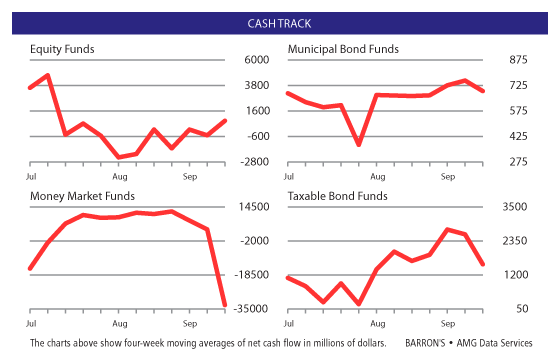The Broken Buck Stops Here — or Does It?
WALL STREET TOLD US AUCTION-RATE SECURITIES WERE just like money-market funds but with bigger yields. They also told us money-market funds were just like cash. What’s next? The check’s in the mail?
Well, sort of, but it’s from the federal government, not the Street.
Treasury Secretary Henry Paulson on Friday played the role of white knight for the $3.4 trillion money-market-fund industry, which was looking like the next financial domino to fall. As part of a broad plan to ease the credit-crisis contagion, he announced a temporary guaranty program for the U.S. money-market mutual-fund industry, the gold standard for bond investors wanting safety, liquidity and yield.
The industry was rocked earlier in the week after the then-$62 billion Reserve Primary Fund said its net asset value fell below the all-important $1-per-share level, hurt by the now bankrupt Lehman Brothers debt it owns. That’s called breaking the buck. Investors are getting 97 cents a share.
“It was a seminal event because the fund was so big and it breaks a solemn pledge that owning shares of a money- market fund is as good as cash,” says Don Phillips, managing director at Morningstar.
Ironically, the Reserve Fund’s manager is veteran Bruce Bent, the creator of money-market funds and critic of many of his peers for taking on too much risk. He didn’t return Barron’s call.
His many peers wasted little time assuring clients their investments were safe. Fidelity, Vanguard, BlackRock and others posted notes on their Websites saying their money funds have no exposure to Lehman. But Putnam closed and will distribute the assets of the $12.3 billion institutional Putnam Prime Money Market Fund because of a surge in redemptions. And, oddly, it said it has no exposure to Lehman, AIG (ticker: AIG) or Washington Mutual (WM).
In all, money-fund assets fell by a record $89.38 billion in the week through last Tuesday, with institutions withdrawing $93.57 billion while individual investors added $4.19 billion, according to the Money Fund Report, published by iMoneyNet. Institutional investors are very nimble and quick on the trigger while individual investors are a bit slower to respond, said Connie Bugbee, managing editor at iMoneyNet.
“Money funds are only as safe as people think they are,” says Lance Pan, director of credit research at Capital Advisors Group. “If people believe they’re unsafe, they’ll pull out, creating a cascading effect,” he adds.
Paulson has put his finger in the dike.
The actions “will go a long way toward…building investor confidence after a period of extraordinary turmoil that has affected money market mutual funds” and others, said Paul Schott Stevens, CEO of Investment Company Institute, a mutual fund trade group, in a news release.
What’s next? Congress has to pass on the rescue package. And, yes, Wall Street will still respect you in the morning.

Whipsawed Money: Equity funds’ net inflows averaged a weekly $753 million for the four weeks ended Wednesday, reports AMG. Money funds had net outflows averaging $33 billion. Taxable bond funds drew a weekly $1.56 billion. Muni funds averaged $692 million in inflows.
E-mail comments to mail@barrons.com
By TOM SULLIVAN
https://www.barrons.com/articles/SB122186338836158459?mod=googlenews_barrons